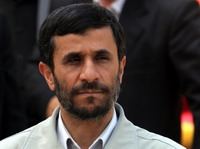Mahmoud Ahmadinejad criticized for lacking meaningful foreign policy
Iran's former chief nuclear negotiator reproved Mahmoud Ahmadinejad for not having a "meaningful foreign policy" and failing to improve the country's ailing economy.

The remarks were among the harshest criticism of Ahmadinejad by a prominent figure in Iran's ruling Islamic establishment.
Rowhani was replaced as top nuclear negotiator when Ahmadinejad came to office in 2005, but remains a member of the Supreme National Security Council and sits on two powerful cleric-run bodies, the Experts Assembly and the Expediency Council.
"It's not clear what goals this government is pursuing," Rowhani told the daily Jam-e-Jam. "In addition to that ... it has failed to make use of opportunities."
Rowhani's remarks came as Ahmadinejad on Tuesday called the recent U.S. intelligence report which concluded Tehran had halted a nuclear weapons program in 2003 a "step forward" in U.S.-Iranian relations.
The weapons program the U.S. report detailed is separate from uranium enrichment, which Iran continues to do, claiming it is for peaceful, energy-generating purposes only and not geared toward arms-making as the West fears.
Rowhani lambasted Ahmadinejad for attributing the growth of Iran's power to his own administration, saying the president has in fact harmed Iran more than he brought benefits.
"We cannot open a letter of credit, is this power?" Rowhani said. "An Iranian student cannot study abroad in a chosen field, is this power? The fact that the economic risks have grown, is that power? The fact that banking activities have been restricted, is this power?"
After two rounds of U.N. Security Council sanctions against Iran for its failure to halt uranium enrichment, risks in business dealings between Iran and the outside world have increased.
Rowhani's criticism echoed complaints early this year from conservative supporters of Ahmadinejad, who contended that his inflammatory rhetoric needlessly goads the West and that he hadn't fulfilled promises to fix Iran's ailing economy.
The former top negotiator said he and his team prevented a U.S. military invasion of Iran in 2003 because they at the time pursued suspending uranium enrichment even though Iran had not yet completed the construction of uranium conversion and enrichment facilities.
"The year 2003 was when the U.S. had gained victory in Afghanistan and Iraq and was thinking of invading Iran," Rowhani said. That year, a highly enriched uranium contamination was discovered at the central Natanz facility.
"A lot of noise was created ... but we repelled the (U.S.) threats," Rowhani said, adding his team successfully deflated the tensions and routed the Iranian nuclear issue into the hands of the U.N. nuclear watchdog agency.
Last month, Rowhani also sharply criticized Ahmadinejad for prosecuting his colleague, Hossein Mousavian, who was acquitted of spying charges leveled by the president.
Rowani's comments come in the wake of mounting rivalry between Ahmadinejad and former President Akbar Hashemi Rafsanjani, a powerful figure in Iran's clerical leadership who has emerged as a leader of conservatives disillusioned by the president.
Subscribe to Pravda.Ru Telegram channel, Facebook, RSS!





